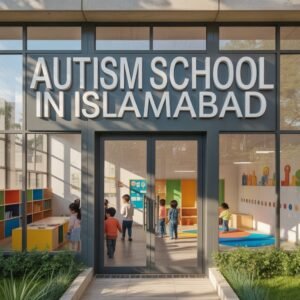For parents and caregivers in Islamabad, the journey following an autism diagnosis is one paved with profound love, unwavering dedication, and a deep-seated desire to find the right educational environment for their child. This search for a supportive autism school in Islamabad is about much more than academics; it is a quest for a partner in your child’s development—a sanctuary that not only understands the unique world of autism but possesses the expertise, compassion, and resources to help your child thrive. The right school can be the single most transformative factor in unlocking a child’s potential and paving the way for a future filled with independence and fulfillment.
Autism Spectrum Disorder (ASD) is, by its very nature, a spectrum. This means that every child presents a unique constellation of strengths and challenges. One child may have an extraordinary memory and intense focus on specific interests, while facing significant hurdles with verbal communication and social interaction. Another might be highly verbal but struggle with sensory processing, making a typical classroom environment overwhelming. This beautiful complexity is precisely why a specialized, individualized approach is not just beneficial—it is essential. A mainstream educational setting, despite its best intentions, is often ill-equipped to provide the structured, low-stimulus, and therapeutic environment that children on the spectrum require to feel safe, understood, and ready to learn. The role of a dedicated autism school in Islamabad is to fill this gap, creating an educational experience that is as unique as the children it serves.
The Hallmarks of an Exceptional autism school in Islamabad: What to Look For:
When you begin the process of evaluating an autism school in Islamabad, knowing the key components of an exceptional program can transform an overwhelming decision into an informed and confident choice. The best institutions are built on a foundation of evidence-based practices, multi-disciplinary collaboration, and a profound respect for neurodiversity.
Individualized Education Plans (IEPs): The Blueprint for Success:
The cornerstone of any effective autism education is a deeply personalized and dynamic Individualized Education Plan (IEP). This is far more than a simple document; it is a living, breathing roadmap for your child’s growth. A reputable school will begin with a comprehensive assessment conducted by a team of specialists. This evaluation delves into your child’s communication abilities, behavioral patterns, sensory profile, academic readiness, and—most importantly—their innate strengths and passions.
From this detailed understanding, a bespoke IEP is crafted with specific, measurable, and achievable goals. This plan is not static; it is regularly reviewed, assessed, and adapted in collaboration with parents and therapists to ensure it remains perfectly aligned with your child’s evolving needs and progress. Whether the focus is on developing functional communication, mastering a life skill, or managing sensory sensitivities, the IEP ensures that every day at school is a targeted step toward greater independence.
An Integrated, Multi-Disciplinary Team: The Power of Collaboration:
A child’s development does not happen in isolated segments. Their ability to communicate is intrinsically linked to their sensory state; their capacity for social interaction is tied to their emotional regulation. Therefore, a top-tier autism school in Islamabadmust integrate therapeutic support directly into the fabric of the school day. Look for a school that houses a collaborative team of experts working under one roof, including:
- Special Education Teachers:Professionals specifically trained in evidence-based instructional strategies for neurodiverse learners, such as Applied Behavior Analysis (ABA), TEACCH, and PECS. They are experts in adapting curriculum and breaking down tasks into manageable steps.
- Speech and Language Therapists:These specialists are crucial for building communication. Their work may focus on developing verbal language, using sign language, or implementing high-tech Augmentative and Alternative Communication (AAC) devices to give every child a voice.
- Occupational Therapists (OTs):OTs are the key to helping children manage their sensory world. They work on fine and gross motor skills, but their role in addressing sensory processing disorder is paramount. They help children who are over-responsive (avoiding textures, sounds) or under-responsive (seeking intense movement) to better regulate their sensory system, which is a prerequisite for learning.
- Behavioral Therapists:Using positive, evidence-based practices, these professionals help children develop adaptive behaviors and reduce challenges that impede learning and social integration, focusing on the “why” behind behaviors to teach more effective skills.
The constant synergy between these professionals—where the speech therapist’s goals are reinforced by the teacher and supported by the OT—creates a powerful, unified approach that generalizes skills across all environments.
A Foundational Focus on Life Skills and Social Integration:
While foundational literacy and numeracy are important, the ultimate goal of a specialized autism education is to foster the greatest possible independence and quality of life. An exceptional program will place a strong, intentional emphasis on teaching functional life skills. This includes everything from foundational self-care like toilet training, dressing, and feeding, to more complex skills like preparing a simple meal, managing a budget, or safely navigating public transport.
Equally critical is the focus on social integration. In a mainstream setting, a child with autism may feel isolated or be bullied. A specialized school provides a safe and structured environment for social learning. Through guided group activities, structured play, peer modeling, and explicit social skills instruction, children learn the nuanced rules of interaction: how to take turns, share, read facial expressions, initiate play, and build genuine friendships. This focus on the practical and the social ensures that education is not just about learning in isolation, but about learning to live a full, connected, and engaged life.
The Sedumrehab Approach: A Holistic Ecosystem for Growth and Connection:

At Sedumrehab, our educational philosophy is rooted in the core belief that every child on the spectrum holds immense and unique potential. We understand that a child cannot learn if they are in a state of sensory overwhelm, anxiety, or communicative frustration. Therefore, our program is designed to be more than just a school; it is a holistic therapeutic learning center where education and well-being are seamlessly intertwined.
Our physical environment is intentionally crafted to be a calm, predictable, and sensory-supportive haven. We utilize soft lighting, quiet spaces, and visual supports to reduce anxiety and create a feeling of safety from the moment a child walks in. Our class sizes are intentionally small, ensuring that each child receives the dedicated, one-on-one attention they need and deserve from our team of special education experts and therapists.
Most importantly, our team does not work in silos. Our teachers, speech therapists, occupational therapists, and behavioral analysts work in lockstep collaboration, holding regular team meetings to ensure every strategy is aligned for your child’s benefit. We focus not only on skill acquisition but also on building self-esteem, resilience, and a genuine joy for learning. Furthermore, we believe in empowering parents as the most important members of the team. We provide regular training, resources, and support to help you reinforce strategies at home, creating a consistent and nurturing environment that extends far beyond our campus walls.
Choosing the right educational path for your child is one of the most significant decisions you will make. It is an investment in their confidence, their independence, and their future happiness. By selecting a dedicated autism school in Islamabad that embodies the principles of individualized planning, multi-disciplinary care, and holistic support, you are opening the door to a world of possibilities for your child. You are choosing to see their abilities first and helping them build a life defined not by their challenges, but by their incredible strengths and potential. At Sedumrehab, we are committed to being your trusted partner on this remarkable journey.
Frequently Asked Questions (FAQs):
1. What is the main difference between a mainstream school and a specialized autism school?
A mainstream school follows a standardized curriculum for neurotypical children, which can be overwhelming for a child on the spectrum. A specialized autism school provides a structured, low-stimulus environment with individualized plans (IEPs), integrated therapy, and a focus on life skills and social integration, all tailored to your child’s unique needs and learning style.
2. What is an IEP and why is it important?
An Individualized Education Plan (IEP) is a customized roadmap for your child’s education. It’s created from a comprehensive assessment and outlines specific, measurable goals for their development. It’s crucial because it ensures your child’s education is targeted and adapts to their progress, focusing on everything from communication and academics to life skills and sensory regulation.
3. What kind of specialists will be working with my child?
A quality autism school employs a multi-disciplinary team that works collaboratively. This includes Special Education Teachers, Speech and Language Therapists, Occupational Therapists (for sensory and motor skills), and Behavioral Therapists. This integrated approach ensures skills learned in one therapy are reinforced across all settings for maximum progress.
4. How do you handle social skills development?
We provide a safe, structured environment for social learning. Through guided group activities, peer modeling, and explicit instruction, children learn crucial interaction skills like taking turns, sharing, reading social cues, and initiating play. This helps build genuine friendships and reduces the isolation often experienced in mainstream settings.
5. How are parents involved in the educational process?
Parents are essential partners. We believe in empowering you through regular training, resources, and support to reinforce strategies at home. This collaboration between our team and your family ensures a consistent, nurturing environment that extends beyond the classroom, which is vital for your child’s generalization of skills and overall growth.


